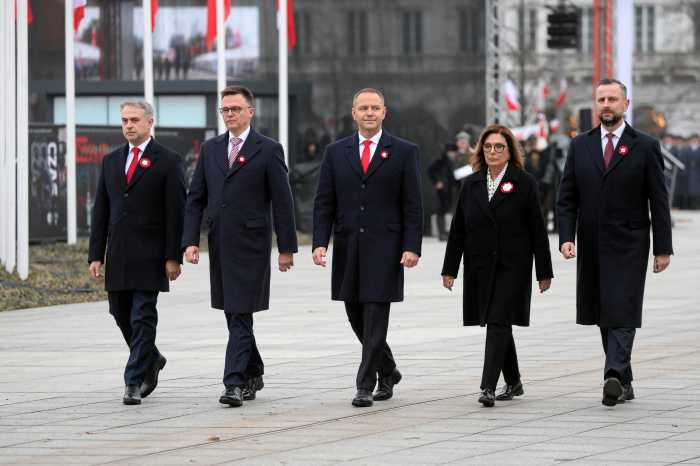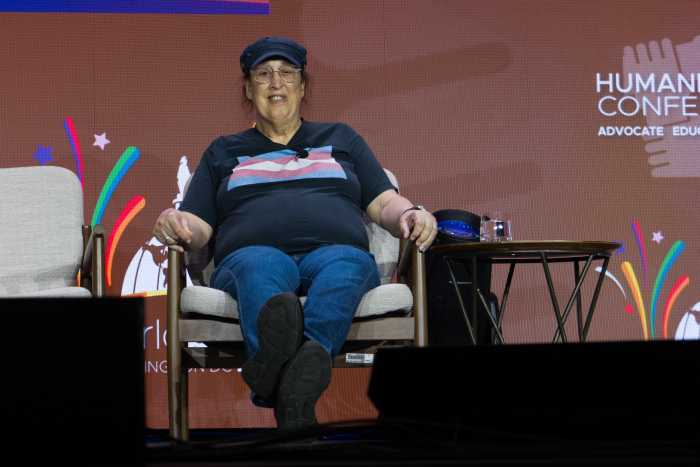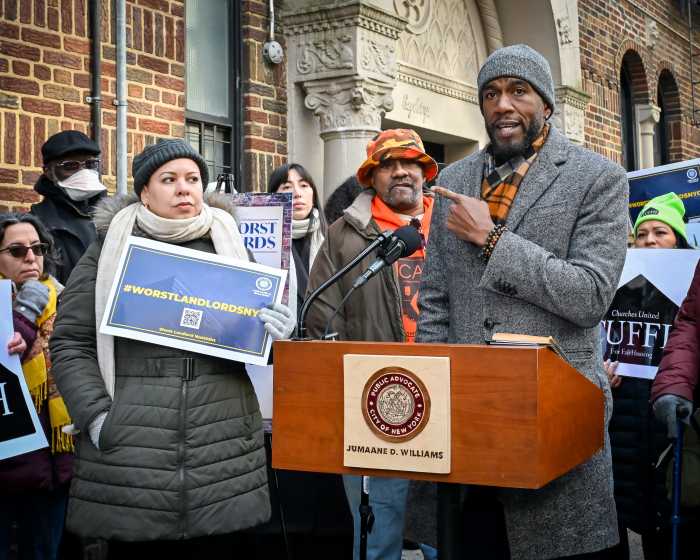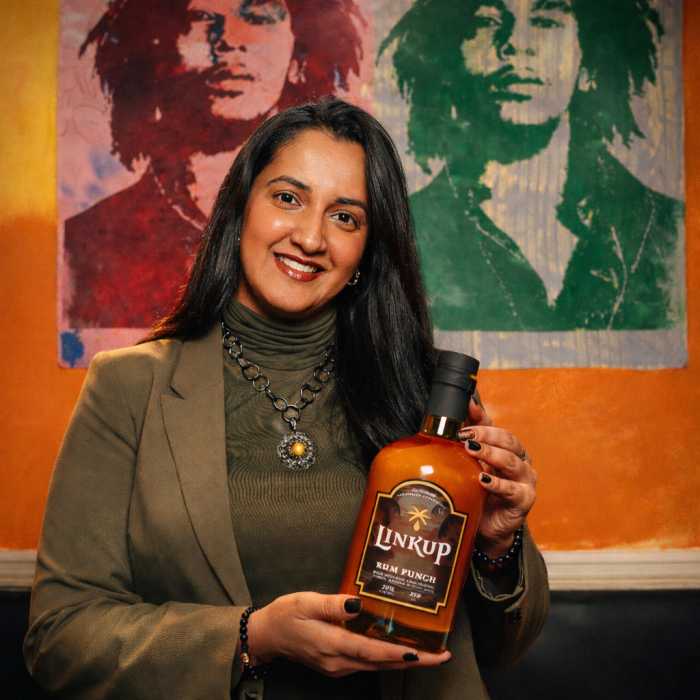In the Republic of Georgia, a muscular December 15 raid by homophobic security forces of the Ministry of Internal Affairs (MIA) on the country’s LGBT organization, the Inclusive Foundation, resulted in the arrest of founder and president Paata Sabelashvili. The officials framed Sabelashvili on trumped-up drug possession charges.
In an exclusive interview with Gay City News by telephone from Tbilisi, Georgia’s capital and largest city, with one million residents, the 31-year-old Sabelashvili said that 13 lesbians present at the Inclusive Foundation’s offices were roughed up and strip-searched by the MIA officers, who hurled homophobic insults at them and “threatened to photograph them and out them to their families.” The officers seized computer disks containing some of the organization’s files, though it is unclear whether they obtained its membership list. “We don’t know what they took off the computers,” Sabelashvili reported.
Arrest of Paata Sabelashvili, LGBT group founder, chills nascent liberation drive
The warrantless raid, during which police officers refused to give their identities, was denounced by the Georgian Young Lawyers Association as riddled with illegalities and part of “a campaign against NGOs [non-governmental organizations] recently.” The Lawyers Association called for an official investigation and disciplinary procedures against officers involved in the raid, saying that in addition to numerous violations of Georgian law, “we consider that abasement of dignity of sexual minorities by MIA officers during fulfillment of their duties, as well as the use of uncensored vocabulary, threats made against foundation members, use of homophobic expressions intended to intimidate them, is directed against ethical norms and is discrediting MIA at the same time.”
Sabelashvili, who speaks excellent English, told this reporter that he was arrested “the day after I had returned from Brussels, where I had been attending a seminar run by ILGA-Europe [a branch of the International Lesbian and Gay Association], ironically on the topic of ‘Hate Crimes and Cooperation with the Police.’” Sabelashvili, who is a member of ILGA-Europe’s board of directors, said the MIA police accused him of “having smuggled significant quantities of LSD, ecstasy, and other illegal hard drugs into the country” on his return from Brussels, although no such drugs were found during the raid or subsequently. The police claimed to have found a tiny quantity of marijuana, “enough for five or six joints,” in an unlocked drawer of one of the desks, Sabelashvili said, but he suggested the pot may have been planted there, as the desk was easily accessible to any of the many visitors to the Inclusive Foundation’s offices. The group runs a resource center, book and video library, and drop-in counseling service there, and also serves as a safe space for meetings of LGBT Georgians.
“Sure I smoke pot, I didn’t deny it, but smoking pot is not a crime, only a civil code violation punishable by a fine of around 200 Euros [or about $288],” Sabelashvili told Gay City News, adding that “drugs are always a very convenient excuse for this kind of raid.” He unequivocally denied having smuggled marijuana or any other kind of drug into the country, saying, “I’d never be so stupid as to do that, especially when abroad as part of my work for ILGA-Europe and the Inclusive Foundation, as I would never expose the organizations I love to any danger.”
Sabelashvili said he was incarcerated for 12 days under conditions he described as “very humiliating and disgusting. First, I was interrogated for six hours, then I was put in a small cell designed to house only six people but that had 28 people stuffed into it, and I was constantly subjected to anti-gay name calling. When after three days I was transferred to prison, the police told the other prisoners I was gay, so they all knew. I was hit by police during my transfer to the prison.”
Speculating on the timing of the MIA raid, Sabelashvili noted that just two weeks before, he’d resigned his full-time job as a grants and public relations staffer for the Georgian office of the Danish Refugee Council, where he had been employed for six-and-a-half years, to devote full time to his LGBT work, “and they probably waited until I was no longer working for the Danes so as not to arouse an international outcry.” Sabelashvili learned that after he left his job with the Danish organization, he was the target of an intensive police investigation; “they interrogated my neighbors about me,” he said.
But Sabelashvili, a well-known figure among human rights activists in Georgia, said that since his arrest the Inclusive Foundation had already heard from both official European bodies and from the political officer at the US Embassy in Georgia, and that he has a meeting scheduled for January 8 with Washington’s deputy ambassador.
Georgia is one of the most culturally homophobic countries among the former republics of the Soviet Union; four-fifths of its population of some 4.3 million people are faithful to the Georgian Orthodox Church, one of the country’s most influential institutions and one militantly opposed to homosexuality. Even after the USSR legalized homosexuality in 1923, it remained a crime in the Georgian Soviet Socialist Republic. (Homosexuality was re-criminalized in the USSR under Stalin in 1933.)
In a recent poll of Georgians by the Caucuses Research Center, when asked, “Would you be on friendly terms with gays?,” 81.4 percent replied “No,” with 71.4 percent responding “No” to the question, “Would you work with a homosexual?” Sabelashvili described gays and lesbians as “the most despised and stigmatized group in Georgia,” with sneering, homophobic media attacks launched with regularity.
Georgia legalized homosexuality in 2000, but only to meet the requirements for its membership in the Council of Europe, a body composed of the foreign ministers and parliaments of 47 nations which since 1949 has worked for European integration, and which emphasizes human rights in its work. (Membership in the Council is important for trade and commerce among its members under treaties it sponsors, and is a necessary first step toward membership in the European Union. A number of former Soviet satellites, including Bulgaria and Romania, also decriminalized homosexuality only in response to European pressure.)
There are no gay bars or explicitly gay-oriented businesses in Georgia.
Georgia’s Inclusive Foundation was founded three-and-a-half years ago by Sabelashvili and a handful of friends and acquaintances, with sponsorship from a five-year Central Asian Project run by the Dutch LGBT group COC, the world’s oldest queer organization, founded in 1946. Other countries included in this COC project were Moldavia, Ukraine, Belarus, Azerbaijan, Kazakhstan, and Kyrgyzstan.
Sabelashvili said that the Inclusive Foundation has an annual budget of between 70,000 and 80,000 Euros (or some $100,000 to $115,000), most of which comes from the Dutch government, with other support coming from ILGA-Europe.
The foundation has a small, part-time staff, including three program staffers, two lawyers, two doctors (a medical doctor for AIDS counseling and a psychologist), a webmaster, and a graphic designer for its magazine ME (“that’s pronounced ‘may’ in Georgian,” said Sabelashvili, “and means the same as ‘me’ in English, a name chosen to emphasize the personhood and human equality of all people, including LGBTs.”)
ME, Georgia’s only LGBT publication, with a print and PDF circulation of about 3,500, is published in both Georgian and English, with funding from COC and the Heinrich Böll Foundation in Germany, founded by the German Green Party and named after the 1972 Nobel Laureate for Literature and noted peace activist.
The Inclusive Foundation has been under frequent attack by the Georgian Orthodox Church, and because the level of homophobia is so high and most LGBT Georgians are in the closet, large public meetings are difficult to hold. The last public event was a May 20 meeting marking the International Day Against Homophobia, which was disrupted and brought to a halt by thuggish members of the Orthodox Parents Union. “It drew an audience of 50 people — and for us Georgians, that’s large!” Sabelashvili said with a chuckle.
“A lot of our public work consists of sending guest speakers to events organized by other groups,” the Inclusive Foundation’s president said. “For example, we recently sent guest speakers to a non-curricular seminar organized by second-year law students — it was an ice-breaking experience, for there was a lot of negative attitudes at the beginning, but by the end of the discussion, which was supposed to last only an hour, it had gone on for over three hours, and people were very interested in learning more and taking our materials.”
Sabelashvili said he decided to become a gay activist when studying international relations in Hungary under a scholarship to the Central European University, founded two decades ago by Hungarian-born US philanthropist George Soros’ Open Society Institute to encourage democracy in former Soviet bloc nations. At the university, he made friends with a gay-friendly young American woman and eventually joined an LGBT club that held weekly meetings. “The university was a pretty safe space, and I came out in Budapest,” he said. On his return to Georgia, Sabelashvili said, he “decided to use my organizational skills and my knowledge of writing grant proposals to do something to fight for gay people. I’d always been involved with the causes of marginalized people. But it was not easy to get people together to start Inclusive.”
Sabelashvili said he was released from prison only when, in a plea bargain, he signed a statement, “on the advice of my lawyer,” admitting to having brought a small quantity of marijuana into the country on a previous trip abroad, with a fine of 1,600 Euros (roughly $2,300) and a five-year suspended sentence, during which he is subject to re-arrest and imprisonment for any violation of law. Even though he says he committed no wrong, Sabelashvili said, “I signed because I just wanted to get out. I didn’t think at the time that I was getting any help, and it seemed the only way to avoid a prison sentence. Only after I got out did I learn of the considerable international attention that my case was receiving, and that’s probably why that authorities agreed” to the plea bargain.
The raid and Sabelashvili’s arrest have already had a chilling effect on the Inclusive Foundation’s work. The activist says that “two of our board members have resigned, and some of our volunteers have dropped out — especially after police were spotted by two of our members who were in a café making post-raid nocturnal visits to our closed office and a group of four other police were stationed outside it to follow our members and visitors as they left.”
The Inclusive Foundation’s bi-lingual magazine, ME, is available online in at http://inclusive-foundation.org/home/?page=publications&lang=en. The Georgian Young Lawyers Association statement detailing the illegalities in the police raid on the Foundation is at http://gyla.ge/.
Doug Ireland can be reached through his blog, DIRELAND, at http://direland.typepad.com/.

































